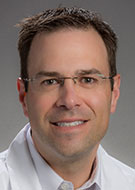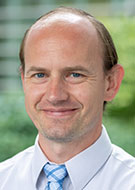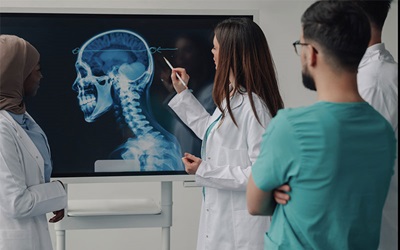The Top 5 Things a New Radiology Resident Needs to Succeed
Program directors weigh in on what can help a trainee learn and thrive


Beginning a radiology residency is many things—exciting, rewarding and challenging, to name a few. A trainee’s skills and attitude can make a huge difference in their experiences during residency.
To help future radiologists prepare for residency, program directors Matthew Kogut, MD, and Cody Schwartz, MD, MPH, shared the top five things they look for in trainees on the first day of residency and beyond.
1: Strong understanding of anatomy and pathophysiology
While residency is where trainees deepen their knowledge, incoming residents should already have a solid foundation in gross anatomy and disease processes, according to Dr. Kogut, associate professor of radiology and program director of the interventional radiology residencies at the University of Washington in Seattle.
“This foundation allows them to focus on building more advanced radio logic reasoning effectively,” he said.
2: Collaborative Mindset and Strong Communication Skills
Strong communication and teamwork are essential in today’s multidisciplinary health care environment. Radiologists, often serving as consultants to other clinicians, must be able to clearly convey findings and collaborate effectively to ensure optimal patient outcomes, Dr. Kogut noted.
“To excel, residents must not only synthesize imaging findings but also communicate clearly and collaborate across specialties to support optimal patient care,” he said. “This is especially true for interventional radiologists who are frequently interacting in multidisciplinary settings.”
A willingness to collaborate is key in residents, agreed Cody Schwartz, MD, MPH, program director and vice chair of education in the Department of Radiology at the University of North Carolina School of Medicine in Chapel Hill.
“Medical knowledge can be taught, but it’s just as important for residents to learn to be humble, kind, team-oriented and teachable.” he said.” These are the qualities that we are searching for in prospective residents and colleagues.”
3: Systematic Approach with Attention to Detail
Radiology involves identifying subtle imaging findings that can significantly influence patient outcomes, Dr. Kogut noted, which is why another important quality involves approaching tasks methodically and carefully.
“A meticulous, systematic approach to image interpretation and reporting is essential,” he said. “This skill is key in successfully interpreting imaging and planning interventional procedures.”
4: Professional Maturity and Emotional Resilience
Residency challenges new physicians to not only develop their clinical skills but also the emotional steadiness and judgment required in a demanding health care environment. Dr. Schwartz emphasized that a professional approach is essential. Success often depends on the ability to stay composed, take responsibility and remain open to growth.
“Working in a large, complex system with many moving parts, I constantly remind our residents to be in control of the things we can control, which are our attitude and our effort,” he said.
It’s imperative for residents not to let the fear of “not knowing” become an obstacle, Dr. Schwartz noted. “We did not get this far in our training by making a lot of mistakes in our lives, but residency is a time to learn from our mistakes and learn what we do not know, which is indeed a lot,” he said.
While embracing the uncomfortable is not easy, it’s crucial for residents to have the willingness to do just that, Dr. Schwartz said.
“Residency marks the shift from student to physician,” Dr. Kogut said. “New residents must embrace responsibility for patient care tasks, demonstrate integrity and be open to constructive feedback as they grow professionally.”
Equally important is developing a sense of ownership over patients and cases, recognizing that taking responsibility is essential not only for learning but also for delivering the best possible care.
“New residents must embrace responsibility for patient care tasks, demonstrate integrity and be open to constructive feedback as they grow professionally.”
— MATTHEW KOGUT, MD
5: Curiosity and Commitment to Lifelong Learning
While emotional resilience helps residents cope with the discomfort of not having all the answers, a commitment to learning pushes them to engage with that discomfort, rather than retreat from it.
“A willingness and drive for life-long learning is one of the major qualities and skills that help make up the exceptional resident—and a better radiologist and colleague,” Dr. Schwartz said. He offered an example of how this might look in an everyday scenario.
“Let’s say a resident is on a CT rotation. They open a case from the list, briefly scroll through it and quickly decide that they have no idea what is going on,” he said. “Their instinct may tell them, ‘Hey, let’s put this one back on the list.’ This reaction may be out of fear—partly because they are worried that they may look not as smart, and partly because it may take them longer to figure it out than a simpler case.”
“I encourage them to never avoid a difficult case,” Dr. Schwartz continued. “They should absolutely try to figure it out. Sure, it may take longer than usual. They may struggle and it may require them to look something up or ask questions. But when a case like that comes across their desk again in the future—and it will—they will know how to approach it because of this and other experiences in training.”
Self-motivated learning can be such a helpful trait for new residents, Dr. Kogut noted. He also emphasized the important need for residents to be curious learners who actively pursue knowledge both during and beyond formal training. “Radiology is a broad and rapidly evolving specialty,” he said. “Therefore, we seek out trainees who have a desire to learn and who want to be taught.”
For More Information
Read previous RSNA News articles on residents and trainees: